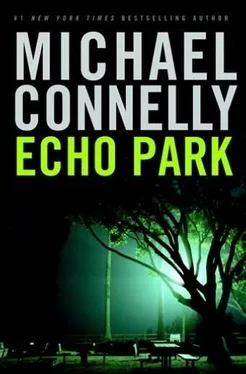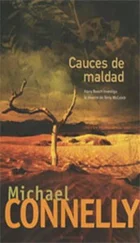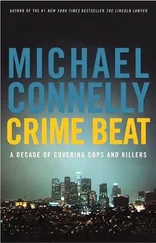On the jump pages of both papers he found sidebar stories that focused on the political response to the shooting and escape. Both papers quoted a variety of local pundits who for the most part said it was too early to tell whether the Beachwood incident would help or hinder Rick O’Shea’s candidacy for district attorney. While it was his case that went horribly awry, the reports of his selfless efforts to help save the wounded law officer while an armed killer was loose in the very same woods could be a balancing positive.
Said one pundit: “In this city, politics are like the movie business; nobody knows anything. This could be the best thing that happens to O’Shea. It could be the worst.”
Of course, O’Shea’s opponent, Gabriel Williams, was quoted liberally in both papers, calling the incident an unpardonable disgrace and laying all blame at O’Shea’s feet. Bosch thought about the missing videotape and wondered how much it would be worth to the Williams camp. Perhaps, he thought, Corvin the videographer had already found out.
In both papers Irvin Irving got his licks in and in doing so took a specific swipe at Bosch for being the epitome of what was wrong in the police department, something Irving as a city councilman would right. He said Bosch should never have been hired back into the department the year before and that Irving, as a deputy chief at the time, had lobbied hard against it. The papers said Bosch was under investigation by the department’s OIS squad and could not be reached for comment. Neither noted that the OIS routinely conducted an investigation of every shooting that involved a police officer, so what was presented to the public seemed unusual and therefore suspicious.
Bosch noticed that the sidebar in the Times had been written by Keisha Russell, who had worked the cop beat for a number of years before finally reaching a level of burnout that led her to ask for a new beat. She had landed in politics-a beat with its own high burnout rate. She had called and left a message for Bosch the night before but he had been in no mood to talk to a reporter, even one he trusted.
He still had her numbers programmed in his cell. When she worked cops he had been her source on a number of occasions, and she had provided him with help several times in return. He put the papers aside and took his first bites of French toast. His breakfast had both powdered sugar and maple syrup on it and he knew the sugar high would help charge him into the day.
After getting through about half of the meal he pulled out his cell and called the reporter’s number. She answered right away.
“Keisha,” he said. “It’s Harry Bosch.”
“Harry Bosch,” she said. “Well, long time no see.”
“Well, with you being a big shot on the political scene now…”
“Ah, but now it is politics and police coming together in a violent collision, isn’t it? How come you didn’t call me back yesterday?”
“Because you know I can’t comment on an ongoing investigation, especially an investigation involving myself. Besides that, you called after my phone died. I didn’t get your message until I got home, and it was probably after your deadline.”
“How is your partner?” she said, putting the banter aside for a serious tone.
“Hanging in.”
“And you came away unscathed as reported?”
“In the physical sense.”
“But not the political.”
“That’s right.”
“Well, the story is already in the paper. Calling to comment and defend yourself now doesn’t exactly work.”
“I’m not calling to comment or defend myself. I don’t like my name in the paper.”
“Oh, then I get it. You want to go off the record and be my Deep Throat on this.”
“Not quite.”
He heard her blowing out her breath in frustration.
“Then why are you calling, Harry?”
“First of all, I always like hearing your voice, Keisha. You know that. And second, on the political beat, you probably have direct lines to all of the candidates. You know, so you can get them to give a quick comment on any issue that comes up in the course of a day. Right? Just like yesterday?”
She hesitated before answering, trying to get a read on where this was going.
“Yes, we’re known to be able to get hold of people when we have to. Except cantankerous police detectives. Sometimes they can be a problem.”
Bosch smiled.
“There you go,” he said.
“Which brings us to the reason you are calling.”
“Right. I want the number that will get me directly to Irvin Irving.”
This time the pause was longer.
“Harry, I can’t give you that number. It was entrusted to me and if he knows I gave-”
“Come on. Entrusted to you and every other reporter covering the campaign and you know it. He wouldn’t know who gave it to me unless I told him, and I’m not going to tell him. You know you can trust me when I say that.”
“Still, I just don’t feel comfortable giving it out without his permission. If you want me to call him and ask if I can-”
“He won’t want to talk to me, Keisha. That’s the point. If he wanted to talk to me I could leave a message at campaign headquarters-which is where, by the way?”
“On Broxton in Westwood. I still don’t feel comfortable just giving you the number.”
Bosch quickly grabbed the Daily News, which was folded to the page with the political fallout story. He read the byline.
“Okay, well maybe Sarah Weinman or Duane Swierczynski will feel comfortable giving it to me. They might want to have an IOU from somebody who’s in the middle of this thing.”
“All right, Bosch, all right, you don’t have to go to them, okay? I can’t believe you.”
“I want to talk to Irving.”
“All right, but you don’t say where you got the number.”
“Obviously.”
She gave him the number and he committed it to memory. He promised to call her back when there was something relating to the Beachwood Canyon incident that he could give her.
“Look, it doesn’t have to be political,” she urged. “Anything to do with the case, okay? I can still write a cop story if I’m the one who gets the story.”
“Got it, Keisha. Thanks.”
He closed his phone and left money for the bill and tip on the counter. As he stepped out of the restaurant he reopened the phone and punched in the number the reporter had just given him. Irving answered after six rings without identifying himself.
“Irvin Irving?”
“Yes, who is this?”
“I just wanted to thank you for confirming everything I always thought about you. You are nothing but a political opportunist and hack. That’s what you were in the department and that’s what you are out of it.”
“Is this Bosch? Is this Harry Bosch? Who gave you this number?”
“One of your own people. I guess somebody in your own camp doesn’t like the message you’re putting out.”
“Don’t worry about it, Bosch. Don’t worry about a thing. When I get in, you can start counting the days until you-”
Message delivered, Bosch closed his phone. It felt good to have said what he said, and to not worry that Irving was a superior officer who could say and do whatever he wanted without retribution from those he slighted.
Happy with his response to the newspaper stories, Bosch got in his car and drove to the hospital.
ON THE WAY DOWN the hallway in ICU Bosch passed a woman who had just left Kiz Rider’s room. He recognized her as Rider’s former lover. They had met briefly a few years earlier when Bosch happened to see Rider at the Playboy Jazz Festival at the Hollywood Bowl.
He nodded to the woman as she passed but she didn’t stop to talk. He knocked once on Rider’s door and went in. His partner looked much better than she had the day before but still not even close to a hundred percent. She was conscious and alert when Bosch entered her room and her eyes tracked him to the side of her bed. There was no longer a tube in her mouth but the right side of her face drooped and Bosch immediately feared that she had suffered a stroke during the night.
Читать дальше












